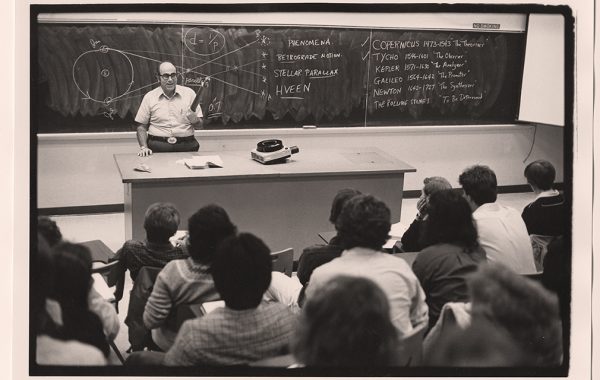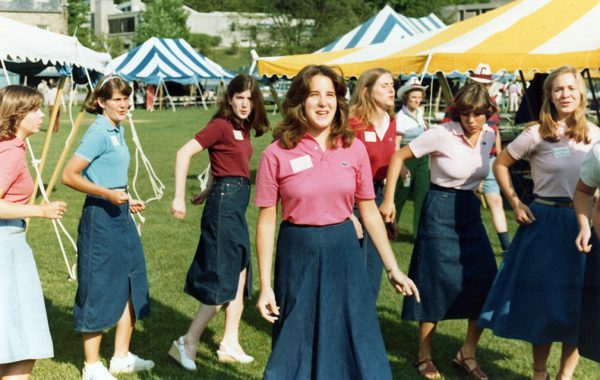Applauding Aveni

I wanted to let you know how much I enjoyed reading about Tony Aveni, especially the stories he told himself (“In a class of his own,” spring 2017, pg. 22).
I was a second semester first-year, still unsure about a major (eventually geology — not too much math!), and I saw the course Stellar Astronomy. I was (and still am) a huge science fiction fan. I decided it would be fun to learn how a lot of that stuff actually works.
Professor Aveni made it way more than just “fun.” I was hooked. Every time I returned to campus, I’d try to find Professor Aveni and get him to autograph his newest book. And every time, he remembered me like we had just seen each other yesterday. Most recently, he had a program during reunion weekend in the Ho Science Center’s Visualization Lab. So awesome.
Thank you, Professor Aveni, for your many lectures, books, and helpful comments.
Steve Shapiro ’75
Houston, Texas
I enjoyed this fine tribute to one of my most esteemed colleagues, especially the section by Tony himself. But he is a very modest man, so this does not tell anywhere near the whole story. I want to add that he was the inspiration behind a major rejuvenation of the entire general education program when he was the head of University Studies. He provided the energy, administrative skills, and many of the ideas that lay behind this. For many years, all Colgate students, most of whom never took a class from the man himself, benefited greatly from his dedicated work because they took courses in this interdisciplinary program. Working with Tony was a pleasure and a privilege.
Nigel Bolland
Charles A. Dana Professor of sociology and Caribbean studies emeritus
I had the pleasure of being a student of Dr. Aveni in the “very early days” — and he was as good then as he is now. This [past] weekend (I was there for my 50th Reunion), I had the pleasure of spending much of an afternoon with Dr. Aveni and his wife and a few other students just talking on the porch at his house in Hamilton. It was the highlight of our reunion weekend. My 50 years of technical success is surely the result of being a student of Dr. Aveni.
Lynn T. Finley ’67
North Providence, R.I.
Encore: a cappella at Colgate
Thank you so much for all of the work you do to create the Scene. I continue to enjoy the variety of subjects, pictures, etc., and I look forward to each issue to keep up with what’s happening at my beloved alma mater. I was especially excited to see the history of a cappella at Colgate in the last issue (“A pitch pipe, a song, and a smile,” spring 2017, Page 13). I am a former Swinging ’Gate (’81–’85), and being a member of this group formed much of my overall experience at Colgate. It was nice to get an overview and timeline of the different a cappella groups that have formed since I was there.
I’m not sure how much has changed since my time, but for me, being a Swinging ’Gate was a profound experience. I don’t think many of my fellow first-years understood what we were getting into when we tried out for the group, that the experience would be bigger than any of us could have ever imagined. Soon enough, we discovered that the ’Gates, along with the Colgate Thirteen, were ambassadors for the college, providing a link between the alumni, parents, and the university. Besides entertaining our peers on campus, life on the road was an expectation to navigate alongside our studies. On weekends, we’d pile into our maroon van and the Thirteen into their famous Grunt, to perform for alumni and parents at tailgates and receptions at the away football games. We booked additional gigs throughout the year to perform at schools, alumni functions, other college jamborees, etc. We also sang the national anthem at every hockey game and performed at the main graduation and reunion concerts. We became very skilled at doing our homework in the back of a van.
Being one of the first all-female collegiate a cappella groups in the country also came with other challenges, as we had to learn how to deliver our songs without the power that comes from the low bass that women don’t typically have. We wrote our own arrangements and figured out ways to showcase other strengths. I have watched with intrigue how a cappella arrangements have transformed over the years, moving from traditional four-part harmony to imitating instrumental parts, to the addition of the percussive beatbox sound that we hear in almost every contemporary a cappella tune today. It’s a genre that I believe will continue to develop as we experiment with all the ways our mouths can produce sound.
Swinging ’Gates alumnae might chuckle when remembering all of the uniforms we tried out over the years. Overall, male collegiate groups haven’t had to stray too far from blazers and khakis. In my four years, our attempts of balancing tradition and contemporary sometimes succeeded… and sometimes didn’t. We went from maroon sweaters with jean skirts, to custom-made silk ruffled shirts (cringe) with maroon skirts, to my favorite: the black pants, rainbow vests, tuxedo shirts, and bowties.
Everyone who’s been a member of an a cappella group will appreciate the sublime joy of being able to break out into four-part harmony, at any given moment, at any location. Long before Pitch Perfect, The Sing-Off, and The Pentatonix, we were harmonizing on subway cars and fishing piers, happily oblivious to the world around us. I continue to be an a cappella fan and aficionado and am currently in the process of writing a musical with mostly a cappella numbers. I owe my passion for this musical genre to my experience in the Swinging ’Gates.
Carla Imperial ’85
Northampton, Mass.
The other Professor Busch
After reading Ms. Mullen’s excellent Tableau piece from the spring 2017 Colgate Scene (“Frederick Busch and Me,” pg. 12, by Caitlin Mullen ’10), I wanted to add a few thoughts regarding Professor Busch and me. Although I did meet Professor Frederick Busch once, the Professor Busch that I have in mind was Briton Cooper “Tony” Busch, who was both my mentor and friend. He shaped not only my appreciation of Colgate, scholarship, and how to be a mentor, but even my ongoing understanding of the world today. Professor Busch was an accomplished historian, being the author of thought-provoking, deeply researched, historical books on the Middle East, the Persian Gulf, and in his later years, naval and military history.
He was one of — if not the — most dedicated and thoughtful professors I ever had the privilege to know during my years at Colgate and in law school thereafter. As a teacher, he was genuinely and deeply involved in the thought process of his students. His expectation was, I believe, that Colgate students would be interested, interesting, and involved with the academic process. Professor Busch was always supportive, but intellectually challenging, friendly, yet thought provoking. Through his unique approach of questioning, lecture, and humor, he stimulated his students’ thoughtfulness in a way that gave me a deeper understanding of the world, the historical context of its modern history, and in hindsight, most importantly, my own intellectual curiosity. While some professors had multiple-choice exams, Professor Busch never did. His expectation was not that students would know the difference between Sunni and Shia in a multiple-choice format, but rather, knowing the distinction [in order to] have an understanding of how those differences impacted the geopolitical dynamic of the Middle East at the turn of the 20th century. He could do all that and make you laugh. In fact, Tony Busch was such a unique teacher filled with humor and personality that an hour class filled with unique insights, details, and concepts seemed just five minutes long. I remember on more than one occasion checking my watch after class because I could not believe the time had flown by so quickly.
As a member of the Colgate London Study Group, he helped me formulate the topic for the independent research study that I worked on in London, regarding the impact of crossnationalism in Asia — a topic that is, if anything, more important and relevant in today’s world than then. He was ahead of his time in so many ways. He was always so insightful and thoughtful about some minutiae of Indian history I had just read as well as the world, yet we would still enjoy the pleasantries and humor of lunch in an English pub or dinner at his home. In addition to my time in London, I acted as a research assistant for his book Britain, India, and the Arabs (1914–1921), and remain honored to be listed in the credits.
I kept in contact with him for years after graduation. In fact, during my honeymoon, I sent him a postcard on how I had visited a spot in Salzburg that he had mentioned in class (my new wife, a Skidmore graduate, could not believe I was writing to my college professor!).
His impact on my life and career with his thought-provoking approach, sense of humor, and personal grace is felt to this day.
Ronald S. Herbst ’73
New York, N.Y.
The Scene welcomes letters. We reserve the right to decide whether a letter is acceptable for publication and to edit for accuracy, clarity, and length. Letters deemed potentially libelous or that malign a person or group will not be published. Letters should not exceed 250 words. You can reach us by mail, or e-mail sceneletters@colgate.edu. Please include your full name, class year if applicable, address, phone number, and/or e-mail address. If we receive many letters on a given topic, we will run a representative sample of the opinions expressed.







